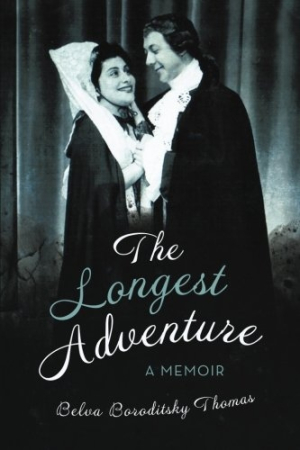The Longest Adventure
Thomas employs a clear, inviting tone to reveal optimism in the midst of change, binding themes of music, domesticity, and love.
Belva Boroditsky Thomas, a Canadian soprano who launched her opera career in Britain, recalls momentous and everyday events in this charming memoir. The Longest Adventure spans decades, tracing a path from a close-knit community in Winnipeg to the stage, and from the stage to motherhood and beyond. With an emphasis on “people, work, and service,” the author employs a clear, inviting tone to reveal optimism in the midst of change, binding themes of music, domesticity, and love.
Thomas portrays time spent among friends and relatives in thematic rather than strictly chronological order. She begins with her birth in 1929 as the daughter of Russian Jewish immigrants and ably moves from anecdote to anecdote. Some topics would benefit from consolidation, including a chapter on starting a family and a separate one that centers on her daughter, but the winding approach is otherwise effective. Occasional descriptions of tough moments, such as an attack on a childhood friend, and the effects of anti-Semitism, among others, are treated briskly. Their inclusion helps paint a realistic portrait of life’s ups and downs while still keeping the focus on the author’s gratitude for varied adventures.
A gift for Thomas’s children and grandchildren, the book features details on neighbors, household arrangements, and local activities that may not reach a wider audience. For other second-generation readers, however, broader passages that speak to the difficulties of family legacy resound. One such passage features Thomas’s mother, who, upon hearing that Thomas planned to study in Europe, remarked, “I had to leave my family to help bring them out of that hell. I didn’t want to go, and I never saw them again. You don’t have to leave your home and family, but you choose to do so. How terrible to see you give up the heaven we have created here on earth for you.” The author then states that when her own children were about to leave, she “didn’t tell them the story of [their grandmother’s] heartbreak.” With a strong command of when to elaborate and when to let silence speak for itself, the voice here emerges as refreshingly matter-of-fact.
Thomas’s self-awareness that her “main motivation in life has always been to serve people” and that music is her “spiritual home” weaves throughout, and is best exemplified in sections that describe the Preville Fine Arts Center, which she helped spearhead. Readers intrigued by stories of women’s lives—particularly in terms of holding on to a dream and revisiting it in unexpected ways through a second career later in life—will be inspired by the author’s steady determination.
Reviewed by
Karen Rigby
Disclosure: This article is not an endorsement, but a review. The publisher of this book provided free copies of the book and paid a small fee to have their book reviewed by a professional reviewer. Foreword Reviews and Clarion Reviews make no guarantee that the publisher will receive a positive review. Foreword Magazine, Inc. is disclosing this in accordance with the Federal Trade Commission’s 16 CFR, Part 255.

